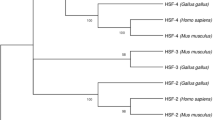Abstract
Macroautophagy is a regulated bulk degradation process of cellular components, mainly long-lived proteins or cytoplasmic organelles. Nutrient depletion is a classic inducer of macroautophagy. In this report, we have induced heat-mediated macroautophagy in several cell lines in the absence of nutrient depletion. Heat treatment increased the autophagic markers LC3-I and LC3-II at the protein levels. Interestingly, expression of a constitutively active HSF1 mutant suppressed basal LC3-II protein level and heat-induced increase of LC3-II. Our results provide evidence that heat is a potent inducer of macroautophagy in mammalian cells, and implicate the negative role of active HSF1 in this process.


Similar content being viewed by others
References
Kondo Y, Kanzawa T, Sawaya R, Kondo S (2005) The role of autophagy in cancer development and response to therapy. Nat Rev Cancer 5:726–734. doi:10.1038/nrc1692
Codogno P, Meijer AJ (2005) Autophagy and signaling: their role in cell survival and cell death. Cell Death Differ 12:1509–1518. doi:10.1038/sj.cdd.4401751
Klionsky DJ, Cuervo AM, Seglen PO (2007) Methods for monitoring autophagy from yeast to human. Autophagy 3:181–206
Mizushima N, Yoshimori T (2007) How to interpret LC3 immunoblotting. Autophagy 3:542–545
Pirkkala L, Nykänen P, Sistonen L (2001) Roles of the heat shock transcription factors in regulation of the heat shock response and beyond. FASEB J 15:1118–1131. doi:10.1096/fj00-0294rev
Vilaboa NE, Galán A, Troyano A, de Blas E, Aller P (2000) Regulation of multidrug resistance 1 (MDR1)/P-glycoprotein gene expression and activity by heat-shock transcription factor 1 (HSF1). J Biol Chem 275:24970–24976. doi:10.1074/jbc.M909136199
Hoang AT, Huang J, Rudra-Ganguly N, Zheng J, Powell WC, Rabindran SK, Wu C, Roy-Burman P (2000) A Novel association between the human heat shock transcription factor 1 (HSF1) and prostate adenocarcinoma. Am J Pathol 156:857–864
Wang Y, Theriault JR, He H, Gong J, Calderwood SK (2004) Expression of a dominant negative heat shock factor-1 construct inhibits aneuploidy in prostate carcinoma cells. J Biol Chem 279:32651–32659. doi:10.1074/jbc.M401475200
Wang JH, Yao MZ, Gu JF, Sun LY, Shen YF, Liu XY (2002) Blocking HSF1 by dominant-negative mutant to sensitize tumor cells to hyperthermia. Biochem Biophys Res Commun 290:1454–1461. doi:10.1006/bbrc.2002.6373
Xia W, Voellmy R, Spector NL (2000) Sensitization of tumor cells to fas killing through overexpression of heat-shock transcription factor 1. J Cell Physiol 183:425–431. doi:10.1002/(SICI)1097-4652(200006)183:3<425::AID-JCP16>3.0.CO;2-M
Fass E, Shvets E, Degani I, Hirschberg K, Elazar Z (2006) Microtubules support production of starvation-induced autophagosomes but not their targeting and fusion with lysosomes. J Biol Chem 281:36303–36316. doi:10.1074/jbc.M607031200
Xia W, Vilaboa N, Martin J, Mestril R, Guo Y, Voellmy R (1999) Modulation of tolerance by mutant heat shock transcription factors. Cell Stress Chaperones 4:8–18. doi:10.1379/1466-1268(1999)004<0008:MOTBMH>2.3.CO;2
Liang XH, Jackson S, Seaman M, Brown K, Kempkes B, Hibshoosh H, Levine B (1999) Induction of autophagy and inhibition of tumorigenesis by beclin 1. Nature 402:672–676. doi:10.1038/45257
Tanida I, Minematsu-Ikeguchi N, Ueno T, Kominami E (2005) Lysosomal turnover, but not a cellular level, of endogenous LC3 is a marker for autophagy. Autophagy 1:84–91
Voellmy R, Boellmann F (2007) Chaperone regulation of the heat shock protein response. Adv Exp Med Biol 594:89–99. doi:10.1007/978-0-387-39975-1_9
Hirsch C, Gauss R, Sommer T (2006) Coping with stress: cellular relaxation techniques. Trends Cell Biol 16:657–663. doi:10.1016/j.tcb.2006.10.006
Xie Y, Chen C, Stevenson MA, Auron PE, Calderwood SK (2002) Heat shock factor 1 represses transcription of the IL-1beta gene through physical interaction with the nuclear factor of interleukin 6. J Biol Chem 277:11802–11810. doi:10.1074/jbc.M109296200
Xie Y, Zhong R, Chen C, Calderwood SK (2003) Heat shock factor 1 contains two functional domains that mediate transcriptional repression of the c-fos and c-fms genes. J Biol Chem 278:4687–4698. doi:10.1074/jbc.M210189200
Singh IS, He JR, Calderwood S, Hasday JD (2002) A high affinity HSF-1 binding site in the 5’-untranslated region of the murine tumor necrosis factor-alpha gene is a transcriptional repressor. J Biol Chem 277:4981–4988. doi:10.1074/jbc.M108154200
Ciocca DR, Calderwood SK (2005) Heat shock proteins in cancer: diagnostic, prognostic, predictive, and treatment implications. Cell Stress Chaperones 10:86–103. doi:10.1379/CSC-99r.1
Westerheide SD, Morimoto RI (2005) Heat shock response modulators as therapeutic tools for diseases of protein conformation. J Biol Chem 280:33097–33100. doi:10.1074/jbc.R500010200
Voellmy R (2005) Dominant-positive and dominant-negative heat shock factors. Methods 35:199–207. doi:10.1016/j.ymeth.2004.08.010
Acknowledgments
We thank Dr. Richard Voellmy for his encouragement and for critically reading this manuscript, and Dr. Bingren Hu, Department of Neurology, University of Miami School of Medicine, for providing LC3 antibody. This work was supported by funds provided by the Chinese Academy of Sciences (Guangzhou Institute of Biomedicine and Health), the Science and Technology divisions of Guangdong and Guangzhou, National Natural Science Foundation of China (30600274) and Science and Technology Projects of Guangdong Province (2007B030701001).
Author information
Authors and Affiliations
Corresponding author
Rights and permissions
About this article
Cite this article
Zhao, Y., Gong, S., Shunmei, E. et al. Induction of macroautophagy by heat. Mol Biol Rep 36, 2323–2327 (2009). https://doi.org/10.1007/s11033-009-9451-4
Received:
Accepted:
Published:
Issue Date:
DOI: https://doi.org/10.1007/s11033-009-9451-4




